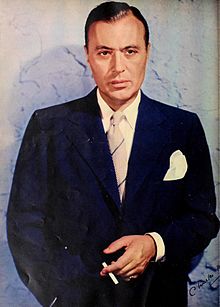Charles Boyer
| Charles Boyer | |
|---|---|

Charles Boyer in 1942
|
|
| Born |
28 August 1899 Figeac, Lot, France |
| Died | 26 August 1978 (aged 78) Phoenix, Arizona, U.S. |
| Cause of death | Suicide |
| Resting place | Holy Cross Cemetery, Culver City, California |
| Occupation | Actor |
| Years active | 1920–1976 |
| Spouse(s) | Pat Paterson (1934–1978) (her death) |
| Children | Michael Charles Boyer (1943–1965) |
| Awards | Academy Honorary Award (1943) |
Charles Boyer (French: [bwaje]; 28 August 1899 – 26 August 1978) was a French actor who appeared in more than 80 films between 1920 and 1976. After receiving an education in drama, Boyer started on the stage, but he found his success in American movies during the 1930s. His memorable performances were among the era's most highly praised, in romantic dramas such as The Garden of Allah (1936), Algiers (1938), and Love Affair (1939), as well as the mystery-thriller Gaslight (1944). He received four Academy Award nominations for Best Actor.
Boyer was born in Figeac, Lot, France, the son of Augustine Louise Durand and Maurice Boyer, a merchant. Boyer (which means "cowherd" in the Occitan language) was a shy, small-town boy who discovered the movies and theatre at the age of eleven. Boyer performed comic sketches for soldiers while working as a hospital orderly during World War I. He began studies briefly at the Sorbonne, and was waiting for a chance to study acting at the Paris Conservatory. He went to the capital city to finish his education, but spent most of his time pursuing a theatrical career. In 1920, his quick memory won him a chance to replace the leading man in a stage production, and he scored an immediate hit. In the 1920s, he not only played a suave and sophisticated ladies' man on the stage but also appeared in several silent films.
MGM signed Boyer to a contract, and he loved life in the United States, but nothing much came of his first American stay from 1929 to 1931. At first, he performed film roles only for the money and found that supporting roles were unsatisfying. However, with the coming of sound, his deep voice made him a romantic star.
His first Hollywood break came with a very small role in Jean Harlow's Red-Headed Woman (1932). After starring in a French adaptation of Liliom (1934) directed by Fritz Lang, he began to receive public favor; Boyer landed his first leading Hollywood role in the romantic musical Caravan (1934) with Loretta Young. Subsequently, he co-starred with Claudette Colbert in the psychiatric drama Private Worlds (1935).
...
Wikipedia
